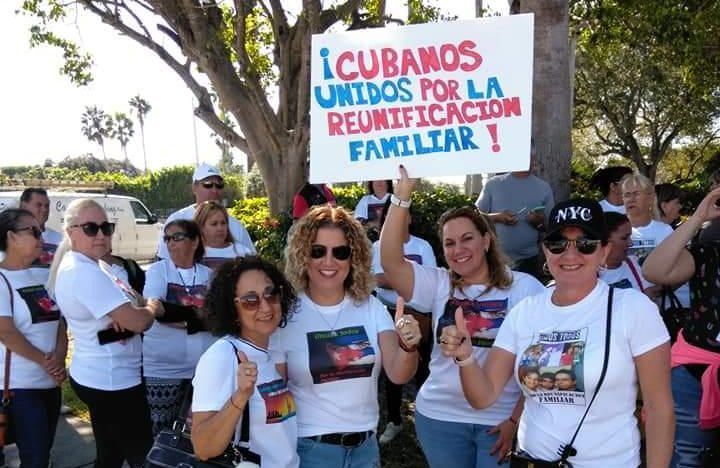The feeling of rejection over the Trump administration’s suspension of the family reunification program for Cubans has been increasing within the Cuban-American community, frustrated by broken promises.
The reunification program, known as “parole,” implied that Cubans who had applied to reunite with their relatives in the United States had priority at the time of receiving the permit, without waiting for the virtual line that takes years and includes other nationalities. In addition to the painful prospect of spending years without seeing their relatives, many of the affected complain that immigration officials charged them in advance for the service, but later they suspended the program and they haven’t even been reimbursed.
“The problem here is the silence. The government suspended the program but didn’t give back the money, which was quite a lot. People are upset with this, but the worst thing is the silence. There is no explanation from immigration or the secretary of state and, in return, all they offer is rejection. Even for us,” explains to OnCuba Jorge Benavides, a Cuban-American immigration lawyer.
The official position of the immigration services is that the program is “under review,” but it’s been like that since it was suspended in 2017, when the U.S. embassy in Havana was virtually closed due to the never fully clarified “sonic attacks.”
But the lawyer refers in particular to an unusual decision made two weeks ago by the Miami-Dade County Commission to urge the federal government to keep the “parole” program suspended, something that a large number of Cuban-Americans have openly rejected, among other reasons, because the county has no power in foreign policy, a space that is exclusive to the federal government. So far Washington has not given importance to the matter.
“Sometimes I think that whoever makes these decisions doesn’t love us Cubans. It is painful that there are Cubans who agree with this, it doesn’t make sense, it seems that they want to punish us for something I don’t understand,” Marta Lucía, a Cuban who has lived in Miami for 10 years, who worked all her life in a cafeteria in Cuba, and has asked to bring over her two children and a grandson, told OnCuba. She opened the process in Immigration and paid the fees, but she’s still waiting for a response from the U.S. government since 2016.
Immigration attorney Melissa Domínguez comments on what happened in recent months regarding Cubans immigrants in the United States and with the Cuban Family Reunification Program. If you have questions about legal issues leave us a comment to answer them in future videos. #ConsultaLegal
Posted by OnCuba on Thursday, October 3, 2019
Lawyer Benavides believes that, in addition to the Trump administration’s strengthening of the Cuba policy, there is also another factor that has stagnated this whole process.
“You have to understand that the philosophy of this administration is contrary to immigration from Latin America. The Cubans are discovering this, it hurts them because they believe they have been a faithful Republican electorate, but that doesn’t seem to matter to the administration. The Cubans were not the only nationality that saw the suspended reunification program, the same happened with the Filipinos, and over there there’s no communism and they are Asian. Deep down the philosophy is total, they don’t want immigrants,” he emphasized.
To this is added the fact that Cubans are being rejected at the border when requesting political asylum. Many are imprisoned in the United States waiting for an immigration judge to decide their fate and are beginning to realize that they are losing the status of exceptionality they enjoyed for years, not only under Republicans but also under Democrats. After all, days before leaving the White House it was Barack Obama who ended the “wet foot-dry foot” policy.
In a very unusual gesture, Cubans have staged two demonstrations against the Trump administration that have not received much media coverage because in South Florida it is difficult for the media to highlight this type of gestures. In addition, no so-called leader of the so-called “hardline exile” has made a statement on this, everyone tends to “get lost,” to not answer the phone during those days.
The first protest was in October last year. The last one was this Sunday. Some 300 people concentrated in a Miami garden located at the intercession of Calle 8 and Avenida 13, in the heart of Little Havana, and which until now was the stage for only anti-Castro demonstrations. The monument dedicated to the 2506 brigade of the Bay of Pigs invasion of Cuba in April 1961 is located there and has been a point of concentration of the hardline exiles for decades.
“I have a daughter and a granddaughter in Cuba. I want them here and this government won’t let me bring them. I voted for Trump, but never again, that man was here, he promised us all the help, but so far I haven’t seen anything,” shouts Graciela Montes de Oca, in the middle of the demonstration.
The protesters, mostly made up of women, were not only extremely critical of Trump but also of their own politicians.
“We have reached a point where there are Cubans who love politicking more and don’t care about the suffering of others. Nobody defends us, it seems we are outcasts,” said Yolesis González, a 27-year-old woman, who intends to bring her mother from the province of Villa Clara where she lives alone after her husband―Yolesis’ father―passed away.
This Monday, no Cuban-American politician, whether local, state or federal, wanted to make a statement on the popular rejection of the suspension of the Cuban family reunification program.










